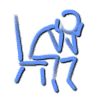Diagnostic criteria for 295.30 Paranoid Type
A type of Schizophrenia in which the following gcriteria are met:
A. Preoccupation with one or more delusions or frequent auditory hallucinations
B. None of the following is prominent: disorganized speech, disorganized or catatonic behavior, or flat or inappropriate affect. (p. 287)
********
Diagnostic criteria for 295.10 Disorganized Type
A type of Schizophrenia in which the following criteria are met:
A. All of the following are prominent:
(1) disorganized speech
(2) disorganized behavior
(3) flat or inappropriate affect
B. The criteria are not met for Catatonic Type.
********
Diagnostic criteria for 295.20 Catatonic Type
A type of Schizophrenia in which the clinical picture is dominated by at least two of the following:
(1) motoric immobility as evidence by catalepsy (including waxy flexibility) or stupor
(2) excessive motor activity (that is apparently purposeless and not influenced by external stimuli)
(3) extreme negativism (an apparently motiveless resistance to all instructions or maintenance of a rigid posture against attempts to be moved) or mutism
(4) peculiarities of voluntary movement as evidenced by posturing (voluntary assumption of inappropriate or bizarre postures), stereotyped movements, prominent mannerisms, or prominent grimacing
(5) echolalia or echopraxia
********
Diagnostic criteria for 295.90 Undifferentiated Type
A type of Schizophrenia in which symptoms that meet Criterion A are present, but the criteria are not met for the Paranoid, Disorganized, or Catatonic Type.
********
Diagnostic criteria for 295.60 Residual Type
A type of Schizophrenia in which the following criteria are met:
A. Absence of prominent delusions, hallucinations, disorganized speech, and grossly disorganized or catatonic behavior.
B. There is continuing evidence of the disturbance, as indicated by the presence of negative symptoms or two or more symptoms listed in Criterion A forSchizophrenia, present in an attenuated form (e.g., odd beliefs, unusual perceptual experiences).
|



